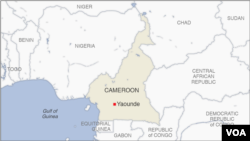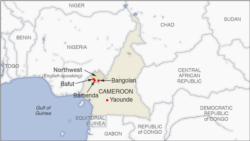In Cameroon, there has been widespread condemnation of recent barbaric violence against civilians in the country's troubled western regions. In the past week, suspected separatists killed 13 civilians, including aid workers, with videos of beheaded women shared on social media.
In video circulated on social media in Cameroon, several men dressed in black order a young woman to lie down and then appear to behead her with a machete.
The killers describe the woman as a traitor, an indication that they are Anglophone separatists.
Cameroon authorities confirmed that a woman was beheaded on Tuesday in the southwestern town of Muyuka. It was the thirteenth such slaying in the last week in Cameroon’s restive English-speaking regions.
Last Friday, another woman was beheaded on video in the northwestern town of Bamenda. Her killers, seen in the video on social media, claim she was seen with a Cameroon military officer sent to fight the rebels.
Christopher Bela, of the Bamenda-based Cameroon Rights Group, says such barbaric killings are becoming more common in the separatist conflict.
"The people of the Northwest and Southwest have been hoping that someone will come in and solve the Anglophone problem [separatist crisis]. They are tired and they would like to have peace. Everyone wants peace. We are hoping that these killings left and right come to an end so that Cameroonians have peace," he said.
In Bamenda this week two teachers were also killed — one was shot and the other stabbed to death.
The rebels, who want independence from Cameroon’s French-speaking majority, see teachers as targets for pushing Francophone dominance on the English-speaking regions.
Cameroon authorities say the rebels are also targeting aid workers and have killed three in the past week.
On August 7, Tanjoh Christopher, a pastor and aid worker with Community Initiative for Sustainable Development, was killed in the northwestern town of Batibo. Country director for the foreign aid group Plan International Cameroon, Miriam Castaneda, condemned the attacks.
"We ascribe to the humanitarian principles of neutrality, impartiality and independence. So, it is sad and painful that these things happen, however, we need to continue to promote the humanitarian principles," she said. "The only thing that we can do is to continue to be optimistic that the situation will improve and continue to work with the people that need us so much."
Governor of the English-speaking Northwest region Deben Tchoffo says the rebels are attacking soft targets because they are getting weaker.
"Those who are trying to disrupt public order in the Northwest Region are going to face the might of our security forces [military]," said Tchoffo.
Separatists’ spokesperson Capo Daniel admits that some fighters have attacked civilians. But he claims most of the attacks are by government-created armed groups to give the rebels a bad image.
"In Bambili [town] where a human rights worker was arrested [abducted], we actually dismissed the soldier [fighter] and we made it public. But the population has to also understand that there are traitors who have received money from the Cameroon military to carry out atrocities," said Daniel, speaking in a message shared on social media.
Cameroon’s military has strongly denied any involvement in targeting civilians and aid workers.
The United States Embassy in Yaounde on Tuesday condemned the killing of aid workers and called for investigations to find and punish the guilty.
The United Nations says Cameroon’s four-year separatist conflict has left over 3,000 people dead and half a million displaced.











